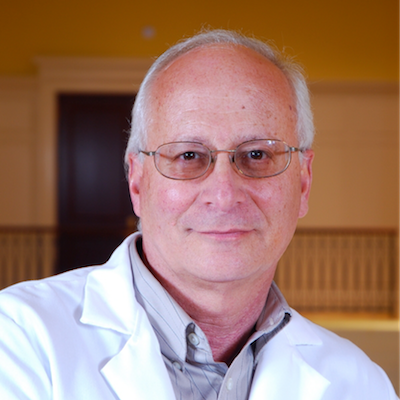steven_zeisel@unc.edu
704-250-5003
Steven H. Zeisel, MD, PhD
Professor Emeritus, Founding Director of the NRI
As the North Carolina Research Campus (NCRC) grows and more scientists and administrators move to Kannapolis, there is one face that has been here since the beginning. Founding NRI Director Steven Zeisel, MD, PhD, was a leader in this innovative venture before the first shovel hit the dirt. From the start, Zeisel was involved in building the dream of the NCRC, including its unique mission, novel approach to research, and distinguished team. Not only has he played an integral role alongside David H. Murdock in developing the vision of the Campus, he has also led the charge to seek scientific synergy between the best minds in nutrition research, through collaboration with the other NCRC organizations.
Under Zeisel’s leadership, this collaboration is the defining hallmark that will revolutionize the field of nutrition worldwide. Zeisel’s passion for the science of nutrition is evident throughout his distinguished career. He initially attended medical school at Harvard and completed his residency in pediatrics at Yale-New Haven Hospital. He earned his PhD in Nutrition from Massachusetts Institute of Technology in 1979.
After rising to the rank of professor at Boston University’s School of Medicine, Zeisel joined UNC-Chapel Hill’s faculty in 1990, becoming professor and chair of the UNC Department of Nutrition (the first department of nutrition in the country in both a school of public health and a medical school). In 1999, he was named Associate Dean of Research for the UNC School of Public Health. Later he began directing UNC’s Clinical Nutrition Research Unit (now called the UNC Nutrition Obesity Research Center). Subsequently, he was named a Kenan Distinguished University Professor of Nutrition & Pediatrics at the UNC Gillings School of Global Public Health and at the UNC School of Medicine in 2005.
Show MoreAs the North Carolina Research Campus (NCRC) grows and more scientists and administrators move to Kannapolis, there is one face that has been here since the beginning. Founding NRI Director Steven Zeisel, MD, PhD, was a leader in this innovative venture before the first shovel hit the dirt. From the start, Zeisel was involved in building the dream of the NCRC, including its unique mission, novel approach to research, and distinguished team. Not only has he played an integral role alongside David H. Murdock in developing the vision of the Campus, he has also led the charge to seek scientific synergy between the best minds in nutrition research, through collaboration with the other NCRC organizations.
Show MoreIn the News
NRI presents inaugural short course for nutrition specialists
May 23, 2016 • The UNC Nutrition Research Institute (NRI) holds its first short course in Nutrigenetics, Nutrigenomics and Precision Nutrition, May 23 – 26. This workshop-style educational course features 16 expert-led presentations on an array of topics including “Nutrition and Epigenetics” and “MicroRNA and Metabolic Profiling.” State-of-the-art practice is an important component of the short course. In hands-on sessions participants will learn to analyze and interpret genetic data using PLINK, Harvard’s open-source, whole-genome association analysis software toolset.
Study of Space Travelers Helps Explain Disease in the Earthbound
April 26, 2016 • Some inherited genetic mutations have obvious harmful effects, such as those associated with cystic fibrosis or sickle cell anemia. Now, scientists are learning more about stress-induced effects of gene mutations. We have known for some time that certain astronauts who had spent time at the International Space Station developed vision problems.
New Assay Tested for Antioxidant-based Products
March 10, 2016 • A team of researchers from the University of North Carolina’s Chapel Hill Nutrition Research Institute (UNC NRI) created and tested what it believes is a more reliable method to measure antioxidant capacity.
Currently, many assays involved hydrogen atom transfer reactions (like in oxygen radical absorbance capacity [ORAC] and total radical trapping antioxidant parameter [TRAP]) or electron transfer. The UNC assay measures the activation of antioxidant response elements (AREs). AREs are said to turn on genes in the body that make enzymes for protecting cells against free radical damage.
Doctoral student wins award for papers in Nutrition Research journal
March 7, 2016 • Daniel Lupu, MD, doctoral student in nutrition, has received the 2015 David Kritchevsky Graduate Student Award from the journal Nutrition Research for two articles published in the November 2015 issue of the journal.
Publications
2020
2019
2018
2017
Contribution of Dietary Supplements to Nutritional Adequacy in Various Adult Age Groups.
Trimethylamine N-Oxide, the Microbiome, and Heart and Kidney Disease.
Reduced brain volume and impaired memory in betaine homocysteine S-methyltransferase knockout mice.
Astronaut ophthalmic syndrome.


